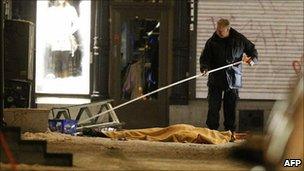Stockholm blasts: Sweden probes 'terrorist attack'
- Published
Police spokesman Ulf Goranzon says investigations are continuing
Two explosions in Sweden's capital Stockholm are being investigated as a "crime of terror", officials say.
A car blew up in a busy shopping area on Saturday afternoon, followed moments later by a second explosion nearby.
Witnesses said a man found dead after the second blast had been carrying an explosive device. Two people were hurt.
PM Fredrik Reinfeldt said the attacks were unacceptable in Sweden's "open society", which he said was a democracy that respected different cultures.
"Our democracy functions well," he told a press conference. "Those who feel frustration or anger have the opportunity to express it without resorting to violence."
Swedish security police have not yet released the dead man's name, although director of operations Anders Thornberg says they now have a clearer idea about him.
"As far as we know it looks like he has been working for himself but we don't know, we have to make that really sure," he said.
"So we are investigating whether there could be more perpetrators. We don't know."
Swedish media have named a 28-year-old man of Iraqi origin as the suspected bomber.
UK connection
The BBC's security correspondent Gordon Corera says Swedish authorities have a name for the individual who registered the car which exploded, and that same individual has been identified by an Islamist website as the attacker.
Our correspondent says that person is believed to have originally been from Iraq, but has spent at least three years in the UK, studying at Luton, perhaps longer.
It is likely that the British security services will be looking into the significance of his time in the UK and any connections to other individuals, our correspondent adds.
Swedish police are investigating a set of e-mails sent shortly before the blasts threatening attacks because Sweden had sent troops to Afghanistan.
Sweden has some 500 soldiers deployed in Afghanistan as part of the international military force.
The e-mails, with MP3 audio files in Swedish and Arabic, were sent to the Swedish security service and the TT news agency.
They called for "mujahideen" - or Islamist fighters - to rise up in Sweden and Europe, promising Swedes would "die like our brothers and sisters".
They also attacked the country for caricatures of the Prophet Muhammad drawn by Swedish artist Lars Vilks.
"The mail was about one man," police spokesman Ulf Goranzon told a press conference on Sunday.
"He was not satisfied with developments in Sweden regarding [the fact] that we have military troops in other countries, that there had been protests and that there have been said bad things about the Prophet [Muhammad]."

A man found dead near the site of the second explosion has not been named
Sweden has a reputation for openness and tolerance, but in recent years, tensions have risen, the BBC's Stephen Evans in Stockholm says.
There has been resentment at immigration as the economy has stuttered, and some Muslims have grown more militant.
In September, the anti-immigration Sweden Democrats won 20 seats in parliament, taking 5.7% of the vote.
If confirmed as a suicide bombing, the attack would be the first of its kind in Sweden. However, Swedish citizens have been linked to suicide bomb plots abroad.
On Thursday, a court in Gothenburg found two Swedish citizens of Somali origin guilty of planning suicide attacks in Somalia.
The imam of Stockholm's main mosque, Sheik Hassan Mussa, said in a statement he deplored "all forms of attacks, violence fears and threats against innocent people, whatever the motive or pretext."
Twin blasts
Saturday's blasts struck as people were out Christmas shopping.
The car exploded on the busy shopping street of Drottninggatan at 1700 (1600 GMT) and the second blast occurred 10 to 15 minutes later on a street about 300m away, police said.
The car had contained gas canisters and there were a series of minor explosions, a spokesman told the BBC.
Unconfirmed reports in Sweden's Aftonbladet newspaper said the man found dead near the site of the second blast had been carrying pipe bombs, as well as a backpack full of nails.
Eyewitnesses saw him lying on the ground with blood coming out of his stomach.
Tweeting about the blasts, external, Foreign Minister Carl Bildt said a terrorist attack that could have been "truly catastrophic" had failed.
In November, Sweden raised its terror alert level from low to elevated because of a "shift in activities" among Swedish-based groups thought to be plotting attacks.
A security official said the threat level had not been raised as a result of Saturday's attacks.
- Published13 December 2010
- Published12 December 2010